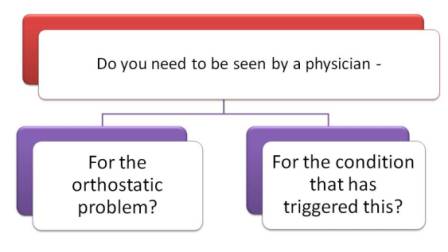Handling Flare-Ups:
Hopefully, you've gotten your orthostatic symptoms under some control and they aren't ruling your life every day. But things change. Sometimes something will happen and your symptoms will get worse. You might get them more often, they might be more intense or both. You might find it's been a couple of hours and the little things you usually do to get over them just aren't working. Before it gets any worse or out of hand, it's time to go to the next level.
The goal is to get things to settle down and to figure out what has triggered the change and modify things if you can to prevent future episodes.
Here are some questions to help you sort out what is going on and get yourself back on track: :
Start Asking Questions
- How do you feel - everywhere, everything?
- What are all the things that are going on with you right now?
- Are you thirsty? Are your lips dry & chapped? Are you so thirsty you want to dive into a pool of cold water?
- If you answered yes - then fluids will probably be part of the helping you feel better
- What symptoms do you have that are related to your orthostatic problem?
- Is it just the ones you get with standing or sitting up too long? like dizziness, lightheaded, thirst, headache with standing/sitting up, short of breath, neck/shoulder pain, other symptoms you usually get?
- What other symptoms do you have?
- Do you have other symptoms - like symptoms of infection? Do you have a sore throat, a cold, a stuffed head/allergies, wheezing, throwing up/diarrhea, fever?
- Do you have an idea what has triggered the change?
- Have you been in the heat for too long?
- Have you missed your fluids, salt or medications?
- Is it time for your monthly cycle (if you are a woman obviously)?
- Are your allergies flaring up?
- Before you go any further, how bad are your feeling? Do you need to see a health professional?
- If you do not need to be evaluated or treated for the orthostatic problem or for the trigger right now, then you can take steps to manage the flare-up at hom.
 First - How bad are things?
First - How bad are things?

![]() Do I need to go to the ER (or see my doctor) for my orthostatic problem?
Do I need to go to the ER (or see my doctor) for my orthostatic problem?
![]() Does the condition that triggered this flare-up need to be evaluated or treated now?
Does the condition that triggered this flare-up need to be evaluated or treated now?
Managing the Flare-Up at Home
If you think you don't need to be seen to address your orthostatic problem or your trigger event doesn't need evaluation, then you can focus on managing your orthostatic symptoms and dealing with the trigger event.
References
- Figueroa JJ, Basford JR, Low PA. Preventing and treating orthostatic hypotension: As easy as A, B, C. Cleve Clin J Med. 2010 May;77(5):298-306. Abstract --- Article PDF
- Rowe, Peter. General Information Brochure on Orthostatic Intolerance and Its Treatment. June 2010. Accessed from http://www.cfids.org/webinar/cfsinfo2010.pdf. Accessed May 28.2012.
- Johnson JN, Mack KJ, Kuntz NL, Brands CK, Porter CJ and Fischer PR. Postural Orthostatic Tachycardia Syndrome: A Clinical Review. Pediatr Neuro 2010; 42:77-85. Abstract.
Author: Kay E. Jewell, MD
Page Last Updated: September 13, 2012
